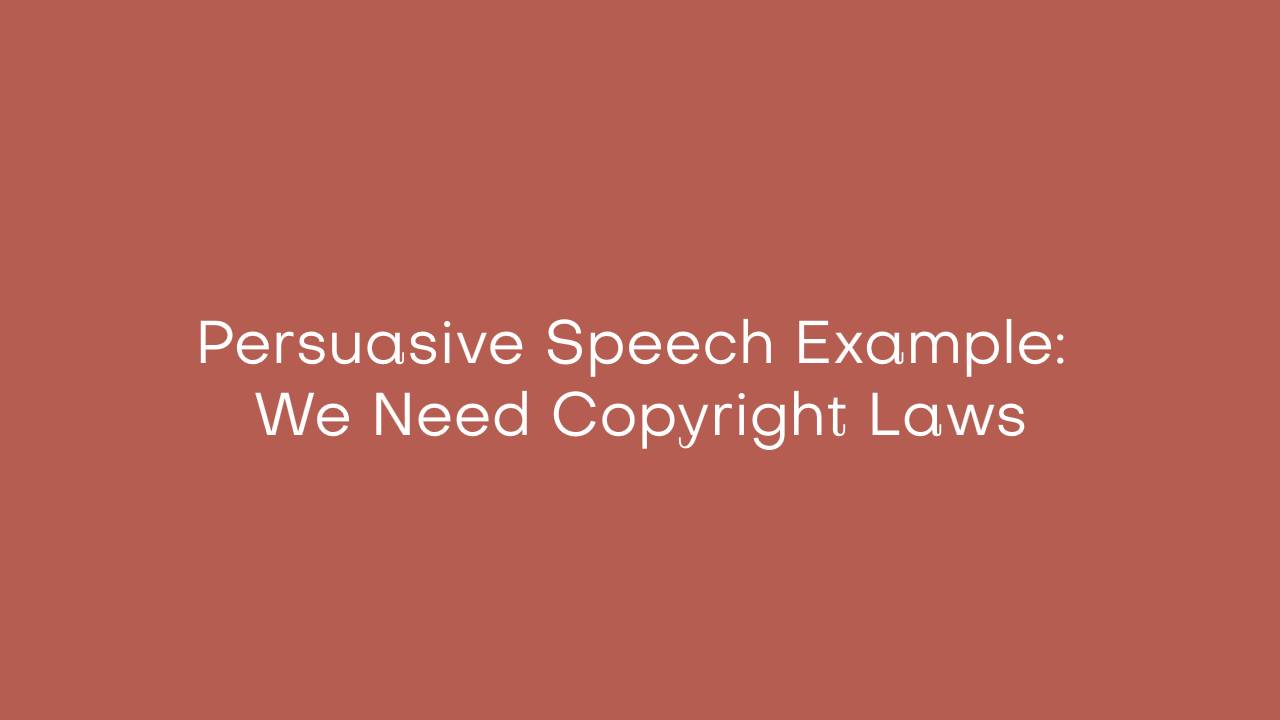Persuasive Speech Example: We Need Copyright Laws

Copyright restrictions are the matter of considerable controversy nowadays. There is a heated debate between the proponents of the so-called proprietary concept, according to which any type of creativity is a good that has its price, and those who claim that copyright creates artificial hurdles for education, creativity, and public access to arts and culture. According to the survey of whether copyright laws entail more harm than benefit to the society, 73% of the respondents support the view that they do (“Do copyright laws do more harm than good?”, 2016). The situation is especially serious for the younger generation, since teens hardly realize that torrents and other internet files are protected by the copyright. Downloading them is as serious a crime of stealing someone else’s property. Thus, it would be rational to address this issue and list the reasons why copyright laws are needed.
Firstly, it seems to be generally understandable that instead of limiting arts and culture, copyright actually encourages them. Now musicians and painters are able to devote their time to a work of art and to create a high-quality product instead of wasting their skills and talent on making ends meet. Intellectual property ensures that the work of an individual will not be abused, and thus it will ultimately spur creative effort (Laskow, 2016).
The core reason for the need of copyright lies in the fact that mental work cannot be precisely measured if compared to the material objects. The disparities in the pricing of intellectual and material property from the viewpoints of the buyer and creator were studied within the scope of behavioral economics by Professor Christopher Buccafusco. He found out that the price of a painting offered by the buyer can be three times less that the price offered by the artist (Laskow, 2016).
In the case of buying a car, its price is comprised of the actual cost of the details and materials, the value of the labor of the engineers and other workers, and the price of oil on the global market. Surprisingly, people turn out to have no problem with the sky-rocketing prices for cars, notwithstanding that it may be considerably exaggerated by the brand. However, in the case of a literary work, the situation seems to be totally opposite. In fact, buyers rarely consider the resources required to write a book, which include education, constant practice, extensive life experience, and personal dedication of the writer. Moreover, as people rely on science and technology in their daily lives, governments and politics are shaping their well-being, and the inherent value of information is gaining more strategic importance. As Stewart Brand, a well-known writer, put it, we need information to be expensive, since proper data at the needed time is able to revolutionaries our entire life (Lai, 2009). By paying for someone’s intellectual achievements, the buyer does not simply commercialize innovation and education. In compliance with this sentiment, Steve Wozniak emphasized another side of the debate, by stating that people should not confuse freedom of information and the time needed to create it, which should be undoubtedly valued (Lai, 2009).
Copyright and patents transform intangible concept into goods, which guarantees quality, since now you the owner is entitled to the legal protection of his/her interest. Conversely, those Internet users, who chant their demands for the freedom of data, choose quantity over quality. Paradoxically, there are still many people paying for accessing pirate resources allowing them to download files by infringing on copyright rights rather than paying to the authors (Young, 2012).
The constant outcry for boundless resources is aggravated by unreasonable attempts of the legislators to control Internet and foster unsubstantiated cost for intellectual property. Therefore, there is another problem to be tackled. Furthermore, putting all data in the public domain is far from being a solution, and this decision may even deteriorate the current state of affairs (Shapiro, 2010).
Additionally, there may be a need to reform and improve the legal framing of the intellectual property, but there is no doubt that it should remain and develop. If there is any uncertainty concerning this matter, one should imagine having written a true bestseller able to offer a promising career and prosperity, and having it stolen. Will the author be willing to have someone copy and sell this book under someone else’s name? When downloading the music track for free, one should understand that he/she is undermining the existence of the band as such. The drop in sales experienced by recording companies in line with the decreasing popularity of live performances have proven to have drastic outcomes for the whole music business. The comparison can be made with the drug industry, which develops and expands primarily illegally, as the absence of parents and rights provides resources for new illicit sales.
All things considered, it should be concluded that the notion of intellectual property is mainly beneficial, and thus it should be protected both legally and socially. One should never the blame the government or property owner for the restrictions preventing from the opportunity to download data, cultural and artistic work for free. Instead, there should be sufficient effort to reform the laws in order make them fit both parties of the debate.
References
Do copyright laws do more harm than good? (2016). Debate.org. Retrieved from http://www.debate.org/opinions/do-copyright-laws-do-more-harm-than-good
Lai, J. (2009). Information wants to be free … and expensive. Fortune. Retrieved from http://fortune.com/2009/07/20/information-wants-to-be-free-and-expensive/
Laskow, S. (2016). Does copyright law work? Columbia Journalism Review. Retrieved from http://www.cjr.org/cloud_control/empirical_ip.php
Shapiro, J. (2010). Debate over copyright in the digital age continues. Adage.com. Retrieved from http://adage.com/article/digitalnext/debate-copyright-digital-age-continues/143346/
Young, C. (2012). The trouble with the copyright debate. Reason.com. Retrieved from http://reason.com/archives/2012/01/25/the-trouble-with-the-copyright-debate